Assassin's Creed Mirage preview: A franchise throwback for better & worse

Depending on your stance on the recent direction of the Assasin’s Creed series, the franchise has been in a kind of freefall lately. After three successful releases in the open-world RPG overhaul that started with Assassin’s Creed Origins, the fanbase is divided. Sure, the gameplay and world design of these RPG-focused Assassin’s games are second to none, rivalling that of beloved fantasy settings. But in true ‘Ship of Theseus’ fashion, if the Assassin’s Creed games of today are so far removed from the source material, can we even call them Assassin’s Creed anymore?
This is where Assassin’s Creed Mirage creeps onto the scene, the latest series entry from Ubisoft that promises to strip everything back to basics. Gone are the sprawling landscapes, the action-focused combat and stat-based gear systems - they’re all replaced with back-to-basics social stealth mechanics and a story that once again sees an underdog organisation uncover and topple a ruling dictatorship.
On paper, this sounds like a dream come true for veteran fans of Assassin’s Creed, and after three hours of hands-on gameplay with Mirage, there’s certainly a lot to be excited about. However, while there’s certainly promise in what we played, it doesn’t take long for concerns to rise, with Ubisoft toeing the line between taking its game design too far back in time, yet also not quite far enough.
- Find out more about Assassin's Creed Mirage here
Back to basics
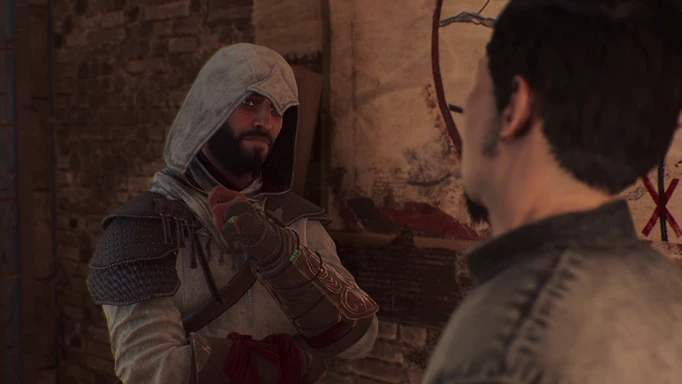
 Click to enlarge
Click to enlargeThose who persevered with Valhalla’s epic runtime will already know who Basim is - the plucky assassin from the Middle East, who ultimately ends up becoming more of an antagonistic force the more we get to know him.
Mirage has Basim centre stage as its protagonist, following his journey from the very beginning as he discovers the Assassin order and works his way up the ranks. In our preview, we played three sections of Assassin’s Creed Mirage: one from a very early section as we get to know Basim a little more, another from during Basim’s assassin training, and a much later section when our protagonist is fully acquainted with the ways of the Order.
It’s in the earlier sections that Mirage shows the most promise. Here, it’s easy to see how the gameplay mechanics of Assasin’s Creed have been completely stripped back to basics.
Pickpocketing and social stealth are much more of a focus. While it was impossible to walk into any town in Origins, Odyssey and Valhalla without NPCs turning their heads, Mirage is designed to let you slip in and out of crowds with minimal attention drawn.
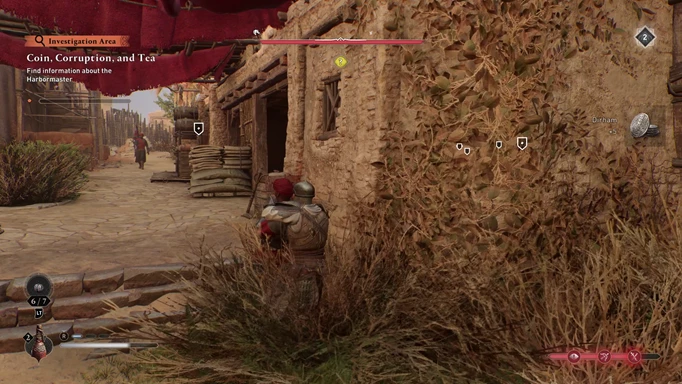
 Click to enlarge
Click to enlargeProgressing through to Basim’s combat training, things are even more barebones here. There’s a light and heavy attack, a dodge, a block, and that’s it. No spartan kicks, no higher powers to bolster your attacks - just a single blade and your wits. There isn’t even any auto-healing.
This is refreshing to see, as it’s apparent that combat is now intentionally designed to be a last resort, not a crutch to pass through missions by the skin of your teeth. Stealth takedowns are usually always an instant kill, whereas enemies will easily take five or six hits to take out once alerted. And they don’t pull their own punches, either. Basim can go down in just a few hits once he’s discovered, further insisting that Mirage is firmly a stealth game, not action.
- Assassin's Creed Mirage is meant to be a smaller experience - here's how long it should take to beat
Running the rooftops
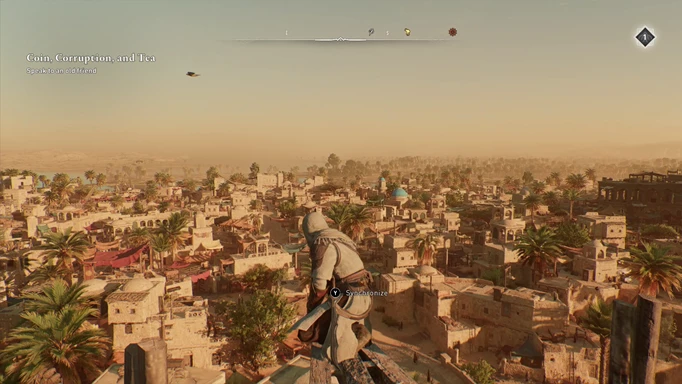
 Click to enlarge
Click to enlargeIt’s in the open-world section of Assassin’s Creed Mirage that I really got hit by a wave of nostalgia. Especially after Valhalla, it’s been a while since we’ve seen a properly dense and built-up urban city. Of course, that’s mostly down to the older time periods the last few games have occupied, but that changes slightly with Mirage, which is set in 9th-century Baghdad.
Despite exploring a time period before the Middle Ages, Baghdad feels extremely similar to the likes of cities we explored in the very first Assassin’s Creed, along with a mix of Constantinople from Revelations. It’s alive with culture and gorgeous architecture around every corner. It’s also bigger than you might think, featuring an expansive city, but also plenty of open space outside the city walls.
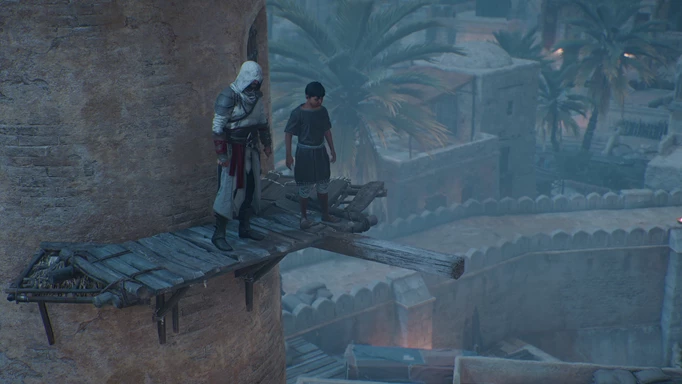
 Click to enlarge
Click to enlargeFrom a brief exploration of Baghdad, it seems like exploring the place will pay off in huge ways. Just like in Assassin’s Creed Valhalla, there are plenty of very short encounters that can act as mini side-quests. One entertaining interaction saw Basim help a young child get down from a high ledge by performing a leap of faith. Not only did this reward me with XP, but it also added a lot to my understanding of Basim’s personality and motivations, and it all took less than a couple of minutes.
Exploring the city is made all the more entertaining by the return of classic parkour, which is an extremely welcome return from older games in the series. The classic design language of buildings is back, so you can climb pretty much everything that you’d expect to be able to around the city.
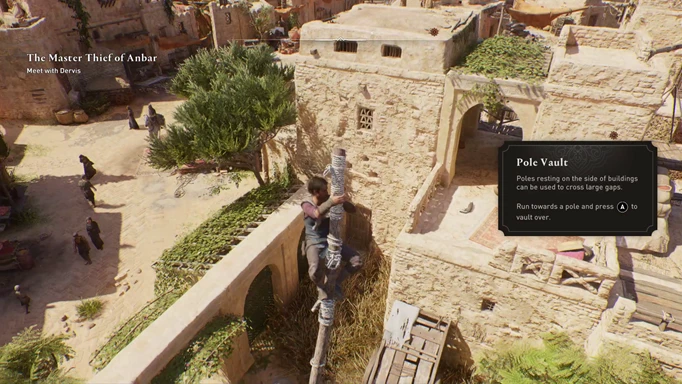
 Click to enlarge
Click to enlargeThere are a few traversal additions too, like the inclusion of ziplines on taller buildings, pole vaults to jump across wider gaps, corner swinging, and the return of rope lifts to gain height extremely quickly. When chase sequences break out, it’s exhilarating to be able to pick a tactical route through the streets and rooftops to lose your pursuers.
As expected, there were a couple of times when Basim would jump somewhere completely unintentional, and it’s a shame Ubisoft is still suffering from these legacy frustrations. It’s soothed somewhat by the return of upwards and downwards traversal, though - holding A or B on the controller will dictate whether Basim traverses up or down, a much-beloved carry-over from Assassin’s Creed Unity.
- Find out if Assassin's Creed Mirage is coming to Xbox Game Pass here
Stealth-deprecating design
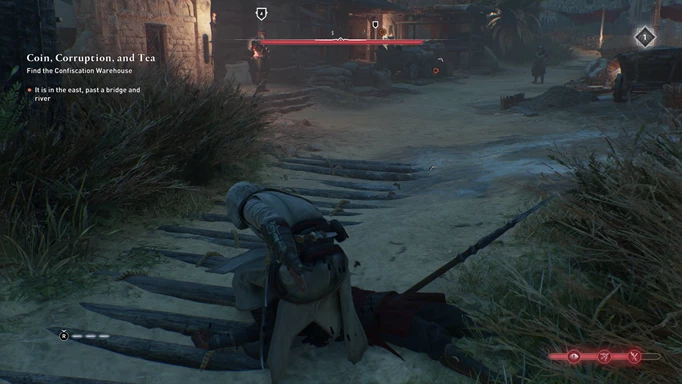

While the return to an older design style has done Assassin's Creed Mirage's open-world wonders, early impressions are that the same can’t be said for the activities you get up to during missions.
In our preview, Basim was tasked with investigating a Harbourmaster who had apparently confiscated the property of one of his good friends, Kong. As we set out to start this mission, a trader approaches Basim and offers him information on the depot’s whereabouts in exchange for a Merchant Favour Token.
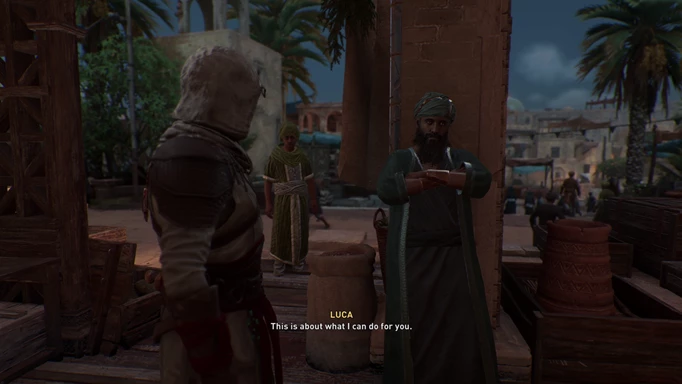
 Click to enlarge
Click to enlargeTokens are a new addition in Mirage, which can be earned by either pickpocketing crowds or helping out NPCs in the world. After giving one up for information, he tells us that the Confiscation Warehouse is to the east, just past a bridge and over the river.
The player is tasked to deduce the location of the Confiscation Warehouse themselves, based on the limited information they know. This sort of mission design is synonymous with the likes of immersive sims, encouraging players to pay attention and engage with the world rather than follow 3D map markers the whole time.
A similar design philosophy ensues when reaching the Confiscation Warehouse, which was swarming with armed guards that belonged to the hostile Caliphate that runs Baghdad. Using an array of basic stealth tools like noise makers, smoke bombs and throwing knives, I was able to clear out the camp completely, albeit with a lot of care and patience.
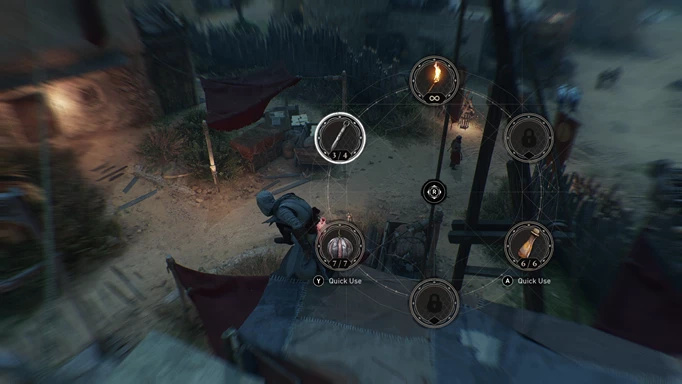
 Click to enlarge
Click to enlargeThe objective here simply explains to “Find information about the Harbourmaster”, with not much else to go on. A couple of small leaflets filled the bar up slightly, but I never managed to fully find the last quest objective, ultimately running around the compound like a headless chicken.
What’s more, once all of the enemies in the warehouse were taken out, a much higher-level guard appeared, stalking the premises to sustain the threat. He couldn’t be taken down in a single stealth hit, only taking out a slither of health if an attempt was made on his life. However, he could take Basim down in a single swipe, wiping the slate clean and resetting the entire mission.
This frustrating dance with the quest design of Assassin’s Creed Mirage proved to be a real dampener on our preview, with concerns over whether the loose quest guidance is really earned like in immersive sims with perhaps more intentional design.
We’re hoping that this friction was mostly caused by us being thrown into a 15-hour save file with very little time to get up to speed on the game’s mechanics, story, and setting. After all, we mustn’t forget that the original Assassn’s Creed also featured very similar obtuse mission structures, which is perhaps what Ubisoft is trying to replicate once more.
- Here's whether Assassin's Creed Mirage will have any multiplayer components
Final thoughts
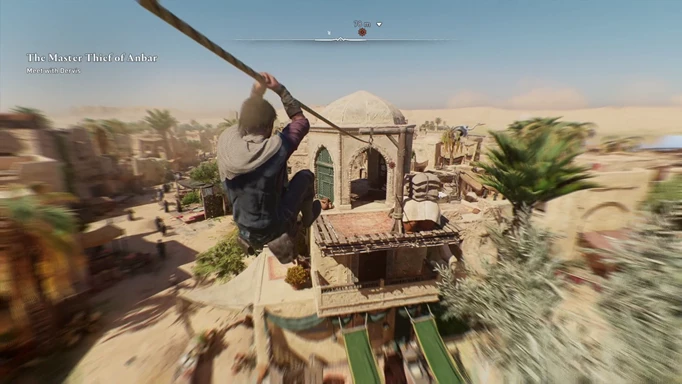
 Click to enlarge
Click to enlargeDespite some grumblings, Assassin’s Creed Mirage does show promise. The actual mission structures are laid out like an investigation board, tasking Basim with chasing down leads and closing cases as he edges ever closer to the centre of the villainous operation.
It’s an engaging way to set up the story that not only harkens back to the very first Assassin’s Creed but also draws inspiration from some of the best parts of the RPG entries - particularly the Cult of Kosmos from Odyssey.
A combination of the complete refocusing of gameplay on stealth mechanics, and the return of a satisfying rooftop playground to parkour across once again, Mirage really does feel like slipping into a comfy pair of old trainers.
It seems that genuine effort has gone into taking Assassin’s Creed back to the drawing board, figuring out what makes it tick, and building upon those bits that matter. Just like the bigger brother RPG games, Assassin’s Creed Mirage might not be for everyone. But it will almost certainly find an audience that it wholeheartedly appeals to.
Previewed on PC.
